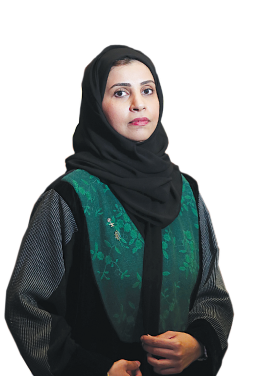RIYADH: A seminar was held in Riyadh on Thursday, the day before International Women’s Day. The event was organized by the Human Rights Council in collaboration with the UN office in Saudi Arabia.
One of Saudi Arabia’s Vision 2030’s goals is to empower women in all fields. Within a span of just two years, the Kingdom, under the leadership of King Salman and Crown Prince Mohammed bin Salman, has undergone massive changes, resulting in a sharp elevation in women’s status, level of participation in the workforce and contribution to the national economy.
A number of women whose achievements have paved the way for a more progressive Saudi Arabia took part in the seminar’s first session. They spoke about their lives, their struggles and their successes. They described their stories as a long journey involving hardship and challenges but which was definitely worth undertaking.
At the second session, King Saud University’s Vice Dean for Student Affairs Dr. Enas Al-Issa addressed the topic, “Empowerment of Saudi Women in Education from Growth to Competition.” Her talk focused on the objectives of Vision 2030 in the context of women’s education and increasing women’s participation in the labor market. She pointed out the existence of 31 programs that require the participation of women which affect the Kingdom’s ranking on the Global Competitiveness Index.

Dr. Taghreed AlHaddab (AN photo)
Speaking during the third session, Dr. Thoraya Obaid, a pioneer in her own right and an inspiration to a generation of both genders, said: “I am the child of the pre-oil area. I am a dinosaur between all these young ladies. My story is that of my country’s transformation. My childhood was built on my father’s vision. He had the power to allow me to continue my studies and he did.”
Obaid was the first Saudi woman to study in the US, having been sent there by King Faisal at a very young age. She said five men supported her in making her life’s “remarkable journey;” her father, King Faisal, Prince Saud Al-Faisal, Kofi Annan and her husband.
Obaid spoke about the importance of men and women being partners and supporters of each other, and of the need to recognize women as the “pillar” of the family everywhere in the world.
“I am from the sunset generation and you, young ladies, are the sunrise generation,” she said, pointing to the younger members of the panel. “There must be dialogue between us, so you can learn from our experiences.”
Lina Al-Maeena, a Shoura Council member, Mount Everest climber and sports enthusiast, spoke of the valuable lessons that can be learned from the life stories of others. “It was a challenge, a big challenge,” she told the audience. “But I view progress as part of the long arc of history. Women did get their rights around the world but it took time. These experiences taught me a valuable lesson — that it takes time.
Al-Maeena said what got her interested in sports was her post-natal depression. Once she had formed the Basketball United Jeddah team, there was no looking back. “What has taken place in the last two years is unprecedented in Saudi Arabia, whether sports in schools, women entering football stadium ... It’s a miracle.”
Dr. Amal Al-Maalami, a member of the Human Rights Council, spoke on the topic of “Women in the Vision of the Kingdom 2030.” She said that she dreamed of becoming a journalist so she could have a hand in preparing the first draft of history. “There is no shortage of remarkable Saudi women in our history,” she said.
For her part, “ethical hacker” Dr. Moudhi Al-Jamea, general manager of the STC Academy, said the world took a new turn with the advent of cybersecurity. “We live in an era where both genders are empowered,” she said, adding that there was not one negative comment on social media when her appointment was announced.
Saudi Arabia was one of the first countries to appreciate the importance of cybersecurity by creating a dedicated cybersecurity authority. The future of Saudi women in cybersecurity looks bright, especially with STC conducting courses and training programs for anyone interested in the subject, Al-Jamea said.
Speaking to Arab News, Dr. Fatima Al-Hamlan, virologist at King Faisal Hospital, said: “This year was a shortcut compared with the past years of struggle. Women have made strides in many fields in a short time. This has raised our expectations. Now, we will not accept anything. We want more and consider it our right. Skilled Saudi women are available. Saudi women proficient in different skills will receive a high position. We are neither a number to fill nor a quota to reach. We are efficient and hardworking women who will do our country proud and serve in its various fields. Today, we are leading in various fields while the world is struggling.”
Earlier, during the opening ceremony, Dr. Bandar Al-Aiban, president of the Saudi Arabia Human Rights Commission, said the Kingdom is continuing on its path of empowering women and enhancing their participation in development.
He said the protection and empowerment of women’s rights is one of the most important areas of reform and development.
Al-Aiban said Saudi Arabia’s Vision 2030 reforms plan sees women as important and active partners. He said that the plan was being implemented through national programs and initiatives, which are raising the ceiling for women’s ambitions and participation in development as is evident from the progress already made in different fields.
























